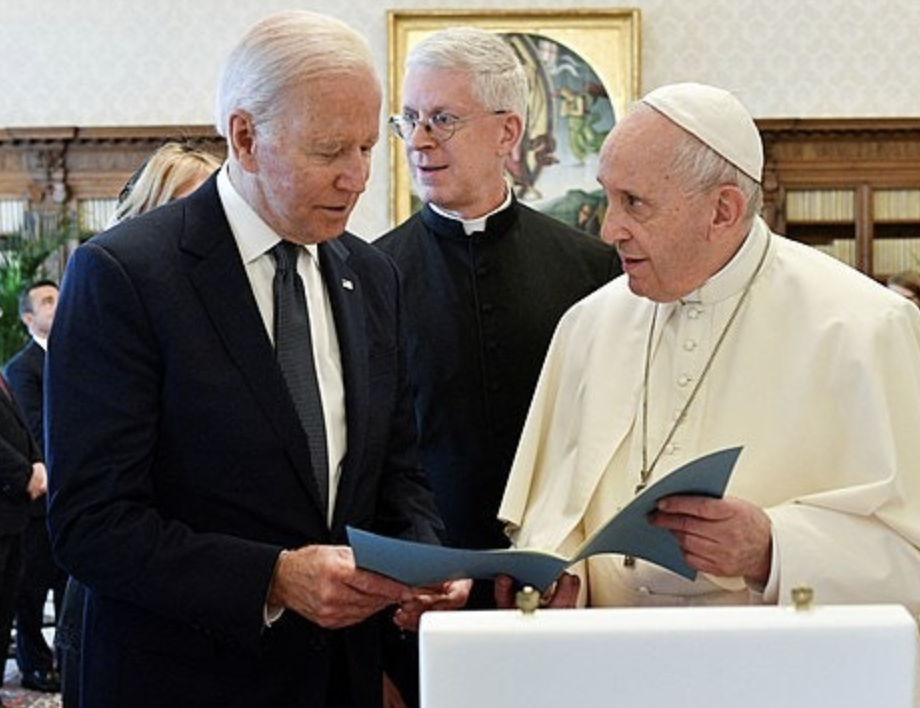Asked if he discussed abortion with Pope Francis during their recent Vatican summit, President Joe Biden said: "No, it didn't. It came up – we just talked about the fact he was happy that I was a good Catholic, and I should keep receiving Communion."
The next day, the Associated Press noted that Biden received Holy Communion at St. Patrick's Church in Rome.
Asked to validate the president's second-hand quotation, Vatican spokesman Matteo Bruni told reporters: "I would consider it a private conversation."
What do U.S. bishops think? That has remained a hot topic as the United States Conference of Catholic Bishops braces for its fall 2021 meetings next week (Nov. 15-18) in Baltimore – its first in-person assembly since the start of the coronavirus pandemic.
What is labeled as "draft 24" of a proposed USCCB statement on "Eucharistic coherence" flashes back to an earlier controversy about Catholic politicians, Holy Communion and an atmosphere of "scandal" among the faithful.
"We repeat what the U.S. bishops stated in 2006: 'If a Catholic in his or her personal or professional life were knowingly and obstinately to reject the defined doctrines of the Church, or knowingly and obstinately to repudiate her definitive teaching on moral issues, he or she would seriously diminish his or her communion with the Church," said this draft from late September – first obtained by The Pillar, a Catholic news website.
The quote continued: " 'Reception of Holy Communion in such a situation would not accord with the nature of the Eucharistic celebration, so that he or she should refrain.' "
As insiders have predicted, this draft of "The Mystery of the Eucharist in the Life of the Church" doesn't mention debates about the sacramental status of Catholic politicians who have consistently served as advocates for abortion rights, such as Biden or House Speaker Nancy Pelosi.
It does, however, connect some dots on this subject, while drawing from the writings of Pope Francis.
"Lay people who exercise some form of public authority have a special responsibility to embody Church teaching in their service of the common good," notes this draft.
"Pope Francis has warned us that in our 'throwaway culture' we need to fight the tendency to view people as 'disposable. … Ultimately, 'persons are no longer seen as a paramount value to be cared for and respected, especially when they are poor and disabled, 'not yet useful' – like the unborn, or 'no longer needed' – like the elderly."
Some U.S. bishops – with close ties to Pope Francis – have argued that this USCCB statement should be delayed or eliminated altogether.
To be blunt, the bishops know that they have other problems that are affecting bottom-line issues in American parishes, according to Timothy P. O'Malley, managing director of the McGrath Institute for Church Life at the University of Notre Dame.
"Denying Communion to Mr. Biden will not stem the tide of declining participation at Sunday Mass," he argued, in America magazine, a Jesuit publication. "It will not end the cronyism that led to the elevation of figures like Theodore McCarrick, or the clericalism that still unfolds in too many U.S. parishes. It will not suddenly bring together a church … whose members are sometimes more likely to bend the knee to an elephant or donkey than to the eucharistic Lord."
However, a new St. Leo University poll offered evidence that these debates will not end soon. Among Catholics who responded, 47.4% agreed that "Communion should be denied to those leaders who are in favor of legal access to abortion."
The ultimate question is whether Catholics who defy ancient church doctrines on abortion and marriage are guilty of "grave" or "mortal" sins. Canon 915 of the Code of Canon Law states that clergy, when ministering to those who "obstinately persist in manifest grave sin," should refuse them Holy Communion, while urging them to go to Confession.
As stated in the Eucharistic coherence draft: "There are sins … that do rupture the communion we share with God and the Church. … "The person who, by his or her own action, has broken communion with Christ and his Church but receives the Blessed Sacrament, acts incoherently, both claiming and rejecting communion at the same time. It is a counter-sign – it expresses a communion that in fact has been broken."
FIRST IMAGE: Photo provided by the White House press office, as featured at The Pillar.

